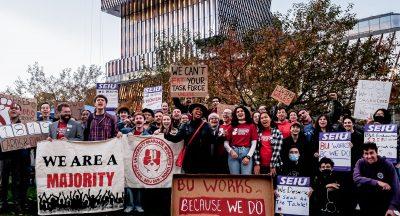Boston University Graduate Workers Union, a group representing over 3,000 graduate students on campus, announced Monday they rejected the University’s proposal of voluntarily recognizing a unit that includes BU PhD candidates but excludes non-PhD graduate students and “non-service” PhD workers.
The union wrote the agreement offered by BU on Sunday is “unacceptable” because the recognition excludes more than half of the union that comprises both PhDs and non-PhD graduate students.

“The University’s insulting efforts to divide and weaken our majority by proposing to exclude more than a thousand of the most precarious workers from our union will not succeed,” the union wrote. “If BU will not recognize the solidarity we have spent years building together, we will move forward with an election as planned.”
If the union accepted the proposal, the University would have recognized the graduate workers as a union without a vote through the National Labor Relations Board, marking the first time the University ever voluntarily recognized a union on campus.
BU Spokesperson Colin Riley wrote the University is “disappointed” the union rejected the offer.
“Boston University has been engaging in ongoing discussions with SEIU 509 and BUGSW. Through these discussions the University offered to voluntarily recognize a union seeking to represent BU PhD students,” Riley wrote. “Regrettably, the Union has rejected the offer made in good faith.”
Daniel Kleinman, an associate provost for graduate affairs in the Office of the Provost and professor of sociology in the College of Arts and Sciences, wrote in an email on Sunday obtained by the Daily Free Press that employers rarely offer to voluntarily recognize labor unions, and he is “personally disappointed” by the graduate students’ decision to turn down the proposal.
“BU has never before offered to voluntarily recognize a labor union. But these are our students, and we sought to find a way forward that was as collegial as possible,” Kleinman wrote. “While the offer did not include voluntary recognition of non-PhD graduate student workers (a population with distinct and highly varied issues and interests), it did include what we believe was a fair and reasonable pathway forward for that group under NLRB processes.”
According to the union’s website, the group voted to affiliate with the Service Employees International Union Local 509, the Boston-based union all BU adjunct and salaried professors belong to, in the summer of 2021.
“I truly believe that representation by an outside, non-academic third party in our University community would change the fundamental relationship that currently benefits our students,” wrote Jean Morrison, the university’s chief academic officer and provost, in a Sept. 23 letter regarding student unionization.
In order to improve graduate student learning and living experiences, the University has launched a number of initiatives such as collecting and posting career development resources, expanding health resources and other services for graduate students at BU.
The union, however, believes that BU is not meeting the needs of graduate students, specifically when graduate students are paid at a level comparable to a low-skilled hourly job.
For the 2021-22 academic year, minimum stipends for PhD candidates ranged from $24,521 for 8 months to $36,782 for 12 months, according to the BU Graduate Education website. However, the Massachusetts Institute of Technology’s living wage calculator indicated a livable wage for a childless single adult in Boston is $47,000.
The union also advocates improving working conditions, protecting international students’ rights, seeking comprehensive healthcare coverage and accomplishing other goals.
Morrison noted graduate students would not be able to access the same scholarly and professional experience if a labor union was formed.
“Unionization at BU may necessitate changes to how the University distributes the funds that are available for graduate education in ways that could negatively impact some of our graduate student cohorts,” Morrison wrote. “This would be unfortunate, as we have worked hard to maximize support for our programs and have enjoyed partnering with our current graduate students toward this goal.”
A National Relations Board-conducted election will be held in the next few months. Graduate students will vote then to determine if they want a union to represent them.
If a majority of graduate students vote to join a union, Morrison said it will create a “one-size-fits-all” model of graduate students that is not sustainable.
“We are proud to support a wide variety of graduate academic programming at BU, and to offer programs and supports tailored to the specific needs and experiences of our many different student populations,” she wrote. “A one-size-fits-all union model is fundamentally incompatible with an intellectually diverse and academically complex university.”
The union declined to comment at this time.
Cici Yu has contributed to writing this story.






















































































































